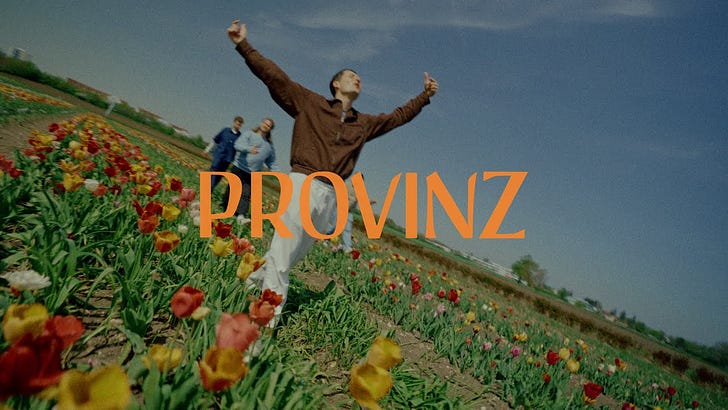Next Friday, June 14, will mark the kickoff of the 2024 UEFA European Football Championship (or Fußball-Europameisterschaft), a month-long showdown of Europe’s top football leagues (that’s soccer to those of us who are Americans). With this year’s games taking place in various cities around Germany, there is already a growing buzz around the championship here in Deutschland, which is likely to reach to a fever pitch over the coming weeks.
While I’m not very much into sports myself and cannot pretend to know more about football/soccer than I actually do, one aspect of the upcoming Europameisterschaft has caught my attention, und zwar (namely) die Musik! A few songs have already been dubbed as “official” songs of this year’s EM and are already gaining attention from music and sports fans alike.
One such song is the newest single from German indie pop band Provinz, “Glaubst du”. The tune was selected by broadcaster ZDF as the station’s official “trailer song” for the upcoming Europameisterschaft – which, as far as I can gather, means the song will be played a lot as games are aired over the next few weeks.
The song’s lyrics center on the joy found in deep friendships which stand the test of time – the friends who believe in us when we may not even believe in ourselves.
Glaubst du an mich? Ich glaub' an dich
Do you believe in me? I believe in you
Will, dass еs für immer ist
I want it to always be that way
Glaubst du an mich? Ich glaub' an dich
Do you believe in me? I believe in you
Haben uns viel zu lang vermisst
We’ve missed each other for far too long
Some verbs in German are often found alongside particular prepositions, and this is precisely the case with the verb glauben (to believe) and the preposition an (on). Anytime we’re talking about believing in something in German, whether in a person, in a concept, or even in God, we’re going to use glauben + an. This verb + preposition pair also calls for the accusative case, meaning it will most often be followed by an accusative pronoun or noun:
Wir glauben an die Demokratie.
We believe in democracy.Sie glaubt an Gott.
She believes in God.Ich glaube an dich.
I believe in you.Glaubst du an mich?
Do you believe in me?
It’s also important to note that if we are not referring to believing in someone or something, but rather that we believe someone, the preposition “an” is not used and it is the dative, rather than accusative, case that follows:
Ich glaube dir.
I believe you.Hat sie ihm geglaubt?
Did she believe him?
Here are a few additional words from “Glaubst du” to add to your vocabulary list:
wehtun – to hurt
vergessen – to forget
gebrochen – broken
doppelt – double
die Nostalgie – the nostalgia
glauben – to believe
das Scheinwerferlicht – the spotlight
endlos – endless
das Fieber – the fever
die Fantasie – the fantasy
das Spiel – the game
die Kindheit – the childhood
Euphorie – the euphoria
das Adrenalin – the adrenaline



